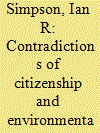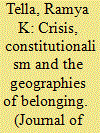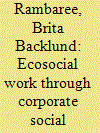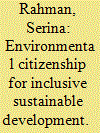|
|
|
Sort Order |
|
|
|
Items / Page
|
|
|
|
|
|
|
| Srl | Item |
| 1 |
ID:
170224


|
|
|
|
|
| Summary/Abstract |
The Indian Ocean contains one of the busiest trade routes in history, connecting East Asia, Southeast Asia, South Asia, the Middle East, and East Africa, as well as giving passage to Europe. Given its historical and economic connections and diffusion of ideas, religions, and cultural traditions, the Indian Ocean region's (IOR) fertile cultural complex can serve as an important platform for addressing climate change. In order to survive and thrive under climate change, societies in the IOR need to undergo profound transformation or metamorphosis. We briefly discuss the history and major climate change issues of the IOR before proposing five suggestions: engaging in regional cooperation on climate change; combining the region's folk science and indigenous traditions with modern science and technology in the formulation and implementation of climate strategies; embracing the region's terraqueous geography; initiating development corridors inland; and ensuring that cities and urban development are sustainable and liveable.
|
|
|
|
|
|
|
|
|
|
|
|
|
|
|
|
| 2 |
ID:
170228


|
|
|
|
|
| Summary/Abstract |
This article scrutinizes the limitations of environmental citizenship among citizens and non-citizens in the Arab Gulf states, with a focus on the United Arab Emirates (UAE). There are particularly heightened concerns about water scarcity, food security, marine pollution, and dependence on oil and gas industries and how states can address these challenges in the Gulf Cooperation Council (GCC). Yet environmental citizenship in the Indian Ocean’s Arabian littoral remains poorly understood both in terms of theoretical and grounded questions. This article considers how labor relations and discourses relating to citizenship, environment and sustainability enable or foreclose environmental reform in GCC countries. It shifts the technological and economic focus predominant in literature on sustainability in the GCC to take a more social perspective and examine distinctions between citizens and non-citizens and the depoliticising of environmental claims and national industrial legacies.
|
|
|
|
|
|
|
|
|
|
|
|
|
|
|
|
| 3 |
ID:
170227


|
|
|
|
|
| Summary/Abstract |
The Anthropocene – as a geological and cultural epoch – brings with it new modes of articulating environmental crisis and citizenship for peoples in India. This essay illustrates how space, scale and identity can be located within contemporary climate political imaginations through the normative canvas of the Indian Constitution. It argues that by thinking about climate change as a collection of dualisms – past/present, near/faraway, futures/futurelessness – Indian vocabularies of constitutionalism can inform authoritative understandings of crisis and citizenship. The article makes use of empirical material collected between 2016–17 for the author's doctoral research. It argues that Indian climate change elites characterize crisis in distinctive ways that draw attention to the symbolic and material implications of interrogating the shifting geographies of belonging in India. It shows how they make use of a framework of constitutionalism that is simultaneously attentive to the semantics of both planetary and subaltern thinking in the Anthropocene.
|
|
|
|
|
|
|
|
|
|
|
|
|
|
|
|
| 4 |
ID:
170226


|
|
|
|
|
| Summary/Abstract |
This article presents a case study of corporate social responsibility (CSR) in coastal areas of Mauritius where company CSR work has brought new ways of engaging with communities. The study examines in what ways companies are involved in ecosocial work and what the challenges and possibilities are from an environmental justice perspective. Based on interviews with representatives of companies and other organizations involved with CSR the study shows that CSR involvement in ecosocial work may bring possibilities for advancing environmental justice for local communities as it can enhance resources and capacity building, as well as bring actors together and play a role in advocacy and empowerment work. Challenges include that companies may have difficulties in contributing to greater justice in terms of community involvement. Moreover, inequalities and substantial environmental justice issues, such as access to land and safe housing, are difficult to fully address through a CSR framework.
|
|
|
|
|
|
|
|
|
|
|
|
|
|
|
|
| 5 |
ID:
170229


|
|
|
|
|
| Summary/Abstract |
Using environmental citizenship as the basis of its activities and initiatives, a community organisation, Kelab Alami, successfully combined environmental action with a socio-ecological systems approach to counter environmental and social injustice. The organisation fused traditional ecological knowledge with science for use in community-initiated ecotourism; engaged with surrounding developers, local authorities and the state government to mitigate environmental damage and maximize job opportunities for the community; nurtured and supported local entrepreneurship efforts and continues to spread environmental awareness and protection. This paper traces the development of Kelab Alami, the training and empowerment of youthful citizen scientists, and its attempt to garner multi-level support and collaboration for its environmental actions. This is a grounded illustration of resource mobilization in action, and a local view of a community’s efforts to cope with poverty, environmental degradation and urbanization; a model that could be adapted and adopted by other communities facing similar circumstances and threats.
|
|
|
|
|
|
|
|
|
|
|
|
|
|
|
|
| 6 |
ID:
170223


|
|
|
| 7 |
ID:
170225


|
|
|
|
|
| Summary/Abstract |
In the Indian Ocean region fish and other marine living resources are vital for food security, local livelihoods, national economies, and future development opportunities. Of particular importance is the small-scale fishing sector, which supplies food and employment for many local people and coastal communities. To ensure the longevity of artisanal and subsistence fisheries, and healthy oceans and marine living resources, improved legal governance is critical. Most Indian Ocean States have adopted fisheries laws to achieve this goal, yet successfully balancing conservation and sustainable use of marine resources remains a challenge. To enhance fisheries laws in efficient, effective and equitable ways, inclusive governance approaches are needed. This article analyses fisheries laws in six Indian Ocean States, and critically assesses the incorporation of participatory approaches that support small-scale fisheries. The comparative analysis provides a resource that will assist States in identifying legal options to enhance public participation and inclusive fisheries governance.
|
|
|
|
|
|
|
|
|
|
|
|
|
|
|
|
|
|
|
|
|